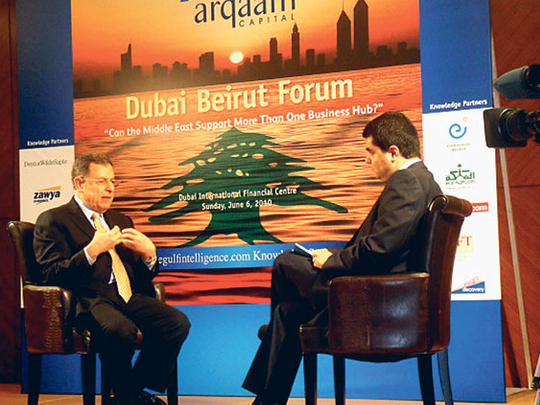
Dubai: Financial reforms in debt-burdened Lebanon and the rest of the region are an unstoppable process, former Lebanese prime minister Fouad Sinora says.
Speaking at a business forum in Dubai yesterday, Sinora also emphasised that the expansion of the Arab region’s markets required the presence of “more than one” financial and business hub.
“Nobody can stop the reforms. It is a journey, not a destination,” Sinora said.
“Reform is something that you have to do when you can, and not when you have to,” said Sinora, who heads the majority bloc in the 128-member Lebanese parliament.
“Everybody is talking about reforms [in the Arab region], but few really mean it, or are ready to take the journey.”
Since the end of the civil war, Lebanon has been reforming its financial and economic sector to overcome the conflict’s negative impact.
Many of these steps have been unpopular and the cost of rebuilding the devastated country meant Lebanon was burdened with massive public debt.
This was made worse after the month-long war launched by Israel in 2006.
According to official figures, Lebanon’s public debt reached $52 billion at the end of last February.
Yet Lebanon in the 1950s and 1960s was known as the Arab region’s major business and banking hub.
Sinora told the forum that Lebanon had succeeded in the past 10 years in raising the GDP per capita and reducing the nominal budget deficit.
The GDP per capita was now “at least double” the $4,500 it reached in 2000.
The nominal budget deficit had dropped from $4 billion in 2000 to nearly $3 billion by the end of 2009, Sinora said.
Concessions
Lebanon, moreover, was developing new laws to allow it to “give certain concessions to certain companies in the field of oil exploration”, Sinora said.
The law could be ratified by the parliament in the next few months.
New hubs, meanwhile, have emerged in the region, namely in the Gulf, while Beirut is seeking to regain its status. Dubai is one of the new prominent hubs.
At the forum ‘Can the Middle East Support More Than One Business Hub?’ Sinora said, “Yes, the region could have several.
“As the markets [of the region] are expanding, there will be more and more hubs,” Sinora said.
“Lebanon is in no way competing with Dubai.”
Each city had its own distinct characteristics.
For instance, Beirut had a smaller area, and Dubai had established free zones.
Human capital was Lebanon’s most important capital.
Relations could be complementary between Dubai and Beirut, and also between several Arab countries, he said.
Complementary
“Complementary will be the name of the game,” among the Arab countries, Sinora said.
The new telecommunications cable connecting India and Western Europe through the Middle East was expected to boost the relationship between the countries it linked.
Sinora noted that Arabs had agreed to establish a common market even before the Europeans did in early 1950s. While the Europeans were more successful in pursuing their agreement, the common Arab market was yet to be established, he noted.
Challenges
The importance of creating links between Arab countries was one of the geopolitical challenges facing the Arab countries at present, Sinora said.
Openness, tolerance and readiness to adapt and change were also among the challenges.
“The most important problem that has been going on and on and is diverting physical and human capital from playing its role, is the Arab-Israeli conflict,” Sinora said.
The continuation of the 60-year-old conflict had caused and was used by some as an excuse for not carrying out the necessary economic reforms.
Dubai will still be top
Most of the senior business and financial managers based in the region believe that Dubai will remain the region’s top business hub in 2015.
According to a survey conducted during a forum at the ‘Arqaam Capital Dubai Beirut Forum’ at Dubai International Financial Centre Sunday, nearly 72 per cent of 100 senior business and financial managers expressed their confidence in Dubai’s ability to remain a financial hub for the region in the coming five years.
Abu Dhabi was second with 16 per cent and Beirut city third with 4 per cent, the survey, a copy of which was obtained by Gulf news, showed












